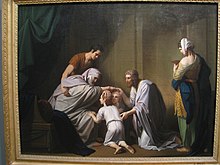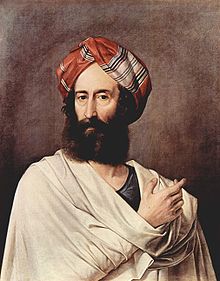This is an old revision of this page, as edited by 40.133.234.46 (talk) at 05:53, 21 May 2022 (cleaning up lead, correcting names, removing non-existent links.). The present address (URL) is a permanent link to this revision, which may differ significantly from the current revision.
Revision as of 05:53, 21 May 2022 by 40.133.234.46 (talk) (cleaning up lead, correcting names, removing non-existent links.)(diff) ← Previous revision | Latest revision (diff) | Newer revision → (diff) Character in the Book of Genesis This article is about the Israelite tribal patriarch. For other uses, see Ephraim (disambiguation).
Ephraim (/ˈɛfraɪjiːm/; Template:Lang-he/אֶפְרַיִם, ʾEfrayim) was, according to the Book of Genesis, the second son of Joseph ben Jacob and Asenath. Asenath was an Ancient Egyptian woman whom Pharaoh gave to Joseph as wife, and the daughter of Potipherah, a priest of ʾĀwen. Ephraim was born in Egypt before the arrival of the Israelites from Canaan.
The Book of Numbers lists three sons of Ephraim: Shuthelah, Beker, and Tahan. However, 1 Chronicles 7 lists eight sons, including Ezer and Elead, who were killed in an attempt to steal cattle from the locals. After their deaths he had another son, Beriah. He was the ancestor of Joshua, son of Nun ben Elishama, the leader of the Israelite tribes in the conquest of Canaan.
According to the biblical narrative, Jeroboam, who became the first king of the Northern Kingdom of Israel, was also from the house of Ephraim.
Biblical criticism

The Book of Genesis related the name "Ephraim" to a Hebrew word for "being fruitful", referring to Joseph's ability to produce children, specifically while in Egypt (termed by the Torah as the land of his affliction).
In the biblical account, Joseph's other son is Manasseh, and Joseph himself is one of the two children of Rachel and Jacob, the other being Benjamin. Biblical scholars regard it as obvious, from their geographic overlap and their treatment in older passages, that originally Ephraim and Manasseh were considered one tribe – that of Joseph. According to several biblical scholars, Benjamin was originally part of the suggested Ephraim-Manasseh single "Joseph" tribe, but the biblical account of Joseph as his father became lost. A number of biblical scholars suspect that the distinction of the Joseph tribes (including Benjamin) is that they were the only Israelites which went to Egypt and returned, while the main Israelite tribes simply emerged as a subculture from the Canaanites and had remained in Canaan throughout. According to this view, the story of Jacob's visit to Laban to obtain a wife originated as a metaphor for this migration, with the property and family which were gained from Laban representing the gains of the Joseph tribes by the time they returned from Egypt; according to textual scholars, the Jahwist version of the Laban narrative only mentions the Joseph tribes, and Rachel, and does not mention the other tribal matriarchs at all.
In the Torah, the eventual precedence of the tribe of Ephraim is argued to derive from Jacob, blind and on his deathbed, blessing Ephraim before Manasseh. The text describing this blessing features a hapax legomenon – the word שכל (sh-k-l) – which classical rabbinical literature has interpreted in esoteric manners; some rabbinical sources connect the term with sekel, meaning mind/wisdom, and view it as indicating that Jacob was entirely aware of who he was actually blessing; other rabbinical sources connect the term with shikkel, viewing it as signifying that Jacob was despoiling Manasseh in favour of Ephraim; yet other rabbinical sources argue that it refers to the power of Jacob to instruct and guide the holy spirit. In classical rabbinical sources, Ephraim is described as being modest and not selfish. These rabbinical sources allege that it was on account of modesty and selflessness, and a prophetic vision of Joshua, that Jacob gave Ephraim precedence over Manasseh, the elder of the two; in these sources Jacob is regarded as being sufficiently just that God upholds the blessing in his honour, and makes Ephraim the leading tribe.
See also
References
- "Ephraim". Merriam-Webster.com Dictionary. Merriam-Webster.
- Genesis 41:50–52
- Genesis 48:5
- Numbers 26:35
- 1 Chronicles 7:20–23
- 1 Chronicles 7:20–27
- 1 Kings 11:26
- ^ Genesis 41:52
- Jewish Encyclopedia, "Ephraim".
- Jewish Encyclopedia (1906)
- ^ Peake's commentary on the Bible.
- ^ Israel Finkelstein, The Bible Unearthed.
- Richard Elliott Friedman, Who Wrote the Bible?
- ^ Genesis 48:1
- ^ Jewish Encyclopedia
 This article incorporates text from a publication now in the public domain: Easton, Matthew George (1897). "Ephraim". Easton's Bible Dictionary (New and revised ed.). T. Nelson and Sons.
This article incorporates text from a publication now in the public domain: Easton, Matthew George (1897). "Ephraim". Easton's Bible Dictionary (New and revised ed.). T. Nelson and Sons.
| Children of Jacob | |
|---|---|
| With Leah | |
| With Rachel | |
| With Bilhah, Rachel's servant | |
| With Zilpah, Leah's servant | |
| Adopted | |